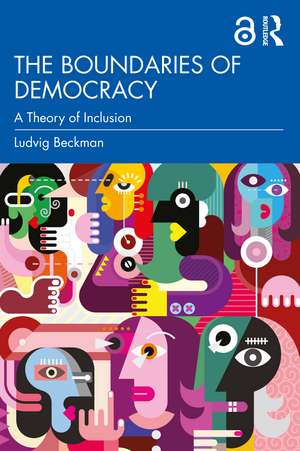The Boundaries of Democracy: A Theory of Inclusion
Autor Ludvig Beckmanen Limba Engleză Paperback – 6 dec 2022
The volume will be of interest to scholars and researchers of politics, especially political theory and democracy.
Preț: 230.99 lei
Preț vechi: 279.25 lei
-17% Nou
Puncte Express: 346
Preț estimativ în valută:
44.20€ • 45.87$ • 36.95£
44.20€ • 45.87$ • 36.95£
Carte tipărită la comandă
Livrare economică 17-31 martie
Preluare comenzi: 021 569.72.76
Specificații
ISBN-13: 9781032418100
ISBN-10: 1032418109
Pagini: 166
Dimensiuni: 156 x 234 x 16 mm
Greutate: 0.26 kg
Ediția:1
Editura: Taylor & Francis
Colecția Routledge India
Locul publicării:Oxford, United Kingdom
ISBN-10: 1032418109
Pagini: 166
Dimensiuni: 156 x 234 x 16 mm
Greutate: 0.26 kg
Ediția:1
Editura: Taylor & Francis
Colecția Routledge India
Locul publicării:Oxford, United Kingdom
Public țintă
PostgraduateCuprins
1. The unresolved problem of democratic inclusion 2. Democratic inclusion in associations 3. Democratic inclusion and the state 4. Subject to legal authority 5. The scope of legal authority 6. Authority and extra-territorial jurisdiction 7. Authority and state borders 8. Does it matter that state borders are arbitrary? 9. End discussion: the limits of democratic inclusion
Notă biografică
Ludvig Beckman is Professor of Political Science at Stockholm University and research leader at the Institute for Futures Studies, Stockholm. His recent work includes books and articles on the boundary problem in democratic theory and on the idea of popular sovereignty in constitutional politics.
Descriere
This book provides a general theory of democratic inclusion for the present world. It presents an original contribution to our understanding of the democratic ideal by explaining how democratic inclusion can apply to individuals in a variety of contexts.
